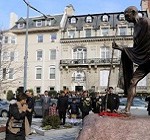Revelatory articles in The Hindu on September 23rd-27th, furnished by evidence disclosed from whistle-blower Edward Snowden on U.S. surveillance operations carried out on Indian diplomats and politicians, have elicited a double U-turn by External Affairs Minister Salman Khurshid. On September 27, without directly implicating the U.S. he labelled the interception of online communication a “serious violation of national sovereignty and individual rights”. His position is in stark contrast to his July statements about U.S. surveillance being a case of “scrutiny” and not “snooping”, shortly after deeming it “unacceptable”. While the existence of surveillance is unsurprising, the U.S. National Security Agency’s methods and targets warrant a closer look at the true intent of the U.S. programmes — and at our leaders who make excuses for them.
The Hindu revealed that inside the New York office of India’s permanent representative to the UN, the Indian embassy and its annex in Washington, the NSA authorised the placement of four different types of spying devices — assiduously copying hard drives, compiling data signals, and collecting data from open computer screens and implants. This new information comes on the heels of another NSA document that shows most U.S. surveillance in India to be on domestic politics, governmental programs, and commercial interests — not likely sources for information on terrorist whereabouts.
Snowden’s disclosures depict the U.S. as a bureaucracy with only lip service paid to democratic ideals while using its considerable power for pure realpolitik. In an interview with The Hindu, Snowden’s confidante Glenn Greenwald argued that “the U.S. goal is to subject virtually everyone to mass surveillance”, especially “increasingly important” countries like India. In this context, American denials of spying ring hollow and it is imperative for Khurshid to solidify his position and formally denounce the United States. Furthermore, in the disclosure of Friday’s joint statement with U.S. President Barack Obama, Prime Minister Manmohan Singh missed an important opportunity to follow the example of Brazilian Prime Minister Dilma Rousseff and to come on record against these breaches of national security. More than ever, it is time for the Indian government to distance itself from the U.S., or else risk looking like its stooge.
Compiled by: Hal Bergold
This blog was exclusively written for Gateway House: Indian Council on Global Relations. You can read more exclusive content here.
For interview requests with the author, or for permission to republish, please contact outreach@gatewayhouse.in.
© Copyright 2013 Gateway House: Indian Council on Global Relations. All rights reserved. Any unauthorized copying or reproduction is strictly prohibited


